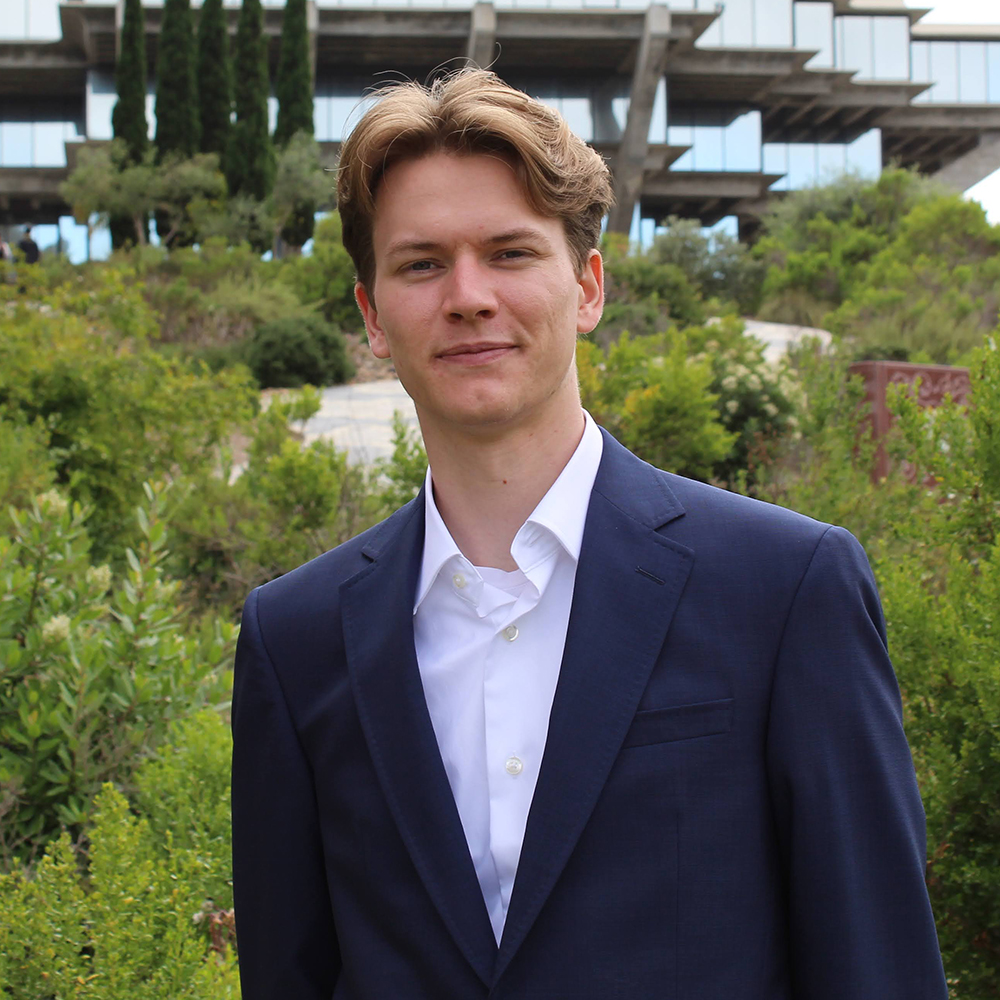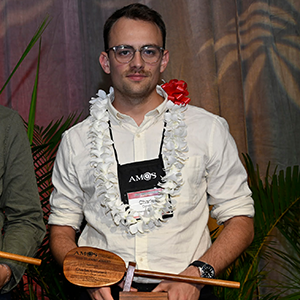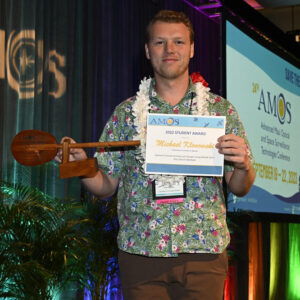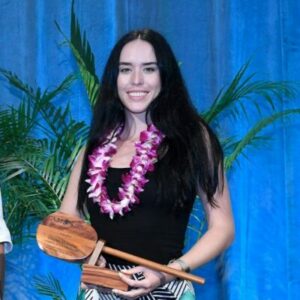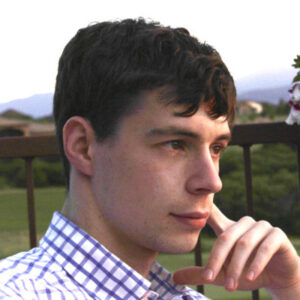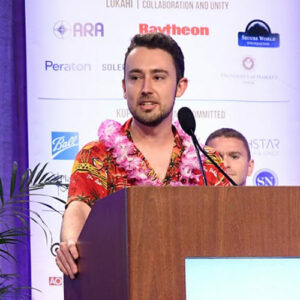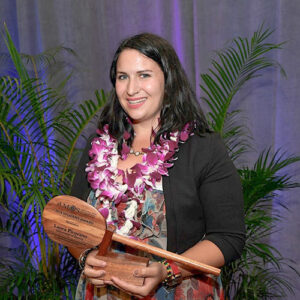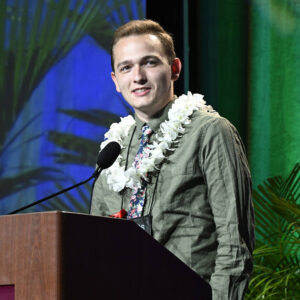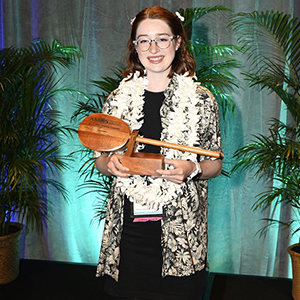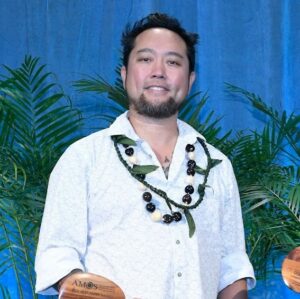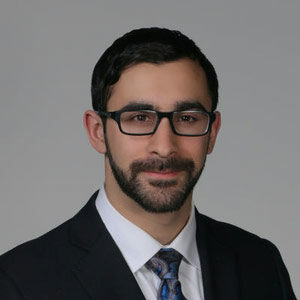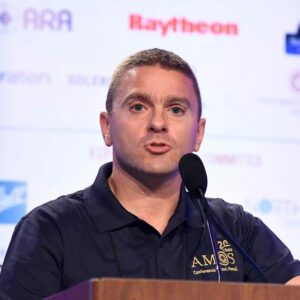Conference Awards
In collaboration with the Space Surveillance Committee of the American Astronautical Society (AAS), the AMOS Conference recognizes outstanding efforts in the field of Space Situational Awareness by presenting a series of awards at the close of the annual conference.
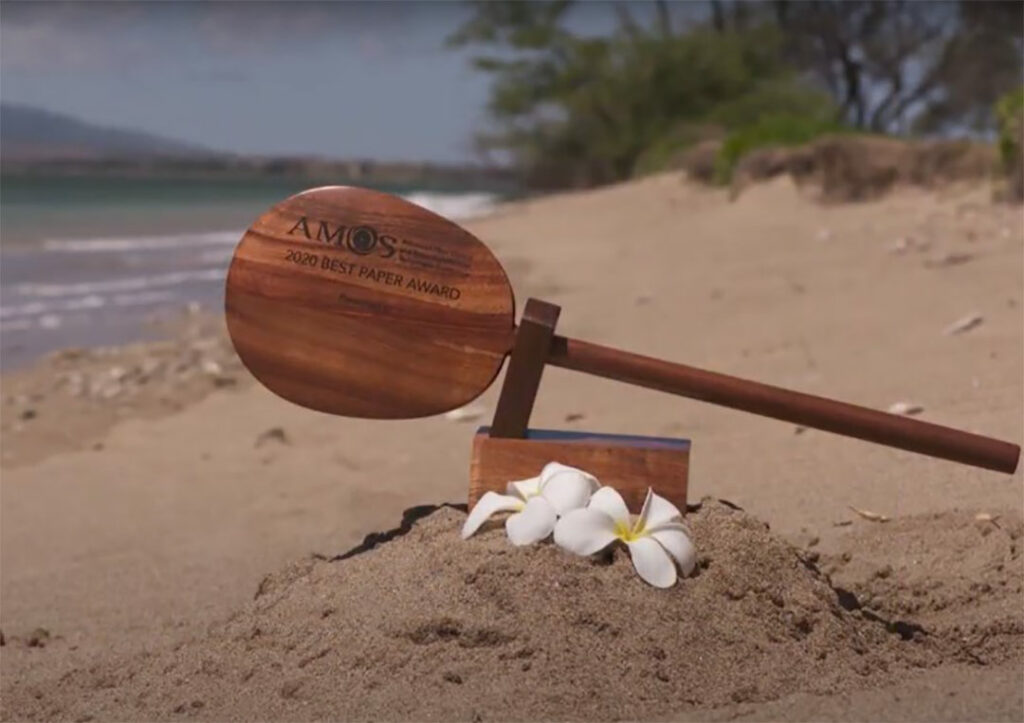
Crafted from Hawaiian koa wood, the custom engraved trophy presented to AMOS award winners is in the shape of an outrigger paddle, signifying the wayfinding of Polynesian voyagers and their reliance on the night sky.
AMOS Student Award
Awarded to the best manuscript submitted and presented by a student, the AMOS Conference Student Award provides funding assistance in the form of a stipend, and recognition in the Conference program. Students wishing to apply for this award must submit their completed manuscript and co-author statement by the Student Award Deadline. There is a maximum of three authors. Applicants must be undergraduate or graduate students pursuing a degree in a science, technology, engineering, and math (STEM) at an accredited college or university. Late submissions will not be considered for the award.
Learn more about speaker deadlines and requirements
Student Award Criteria
Student papers will be reviewed and scored based on the following criteria:
- Genuine work of scholarship applicable to the field of SSA
- Organization and layout
- Technical review of the paper for its contribution to the state-of-the-art in SSA
- Reasonable promise for future research, leadership, or enterprise by the author in the field of SSA
Student Award Co-Author Policy – Statement Required for Eligibility
A student must be first author and primary researcher for a paper to be considered for the Best Student Paper Award. There is a maximum of three authors for papers to be considered for the Student Award. In the case where the student is not the sole author, a single representative of the co-authors, ideally the student’s advisor, is required to send a letter as an email attachment to info@amostech.com prior to the Student Award Deadline as part of the paper submission. This letter shall confirm that the submitting student was the primary researcher and author of the work, including analysis, writing, revising, generating artwork/charts, etc. Any student papers without a corresponding letter will not be considered for the award.
Past AMOS Student Award Winners
2024
Ethan Foss
University California, San Diego
Reachability Analysis of Low-Thrust Cislunar Spacecraft Using State Transition Tensors
2023
Charles Constant
University College London
2022
Michael Klonowski
University of Colorado Boulder
Optimal Cislunar Architecture Design Using Monte Carlo Tree Search Methods
2021
Shaylah Mutschler
University of Colorado Boulder
Application of SoleiTool for Density Estimation using CubeSat GPS Data
2020
Sam Wishnek
University of Colorado Boulder
Robust Initial Orbit Determination Using Streaks and Admissible Regions
2019
James Blake
University of Warwick
Optical Imaging of Faint Geosynchronous Debris with the Isaac Newton Telescope
2018
Laura Pirovano
University of Surrey
Probabilistic Data Association Based on Intersection of Orbit Sets
AMOS Best Paper Award
To qualify for the Best Paper Award, authors must upload their technical papers and copyright agreements to the submission system by the August 29 Technical Paper and Copyright Deadline. Late submissions will not be considered.
Learn more about deadlines and requirements
Best Paper Award Criteria
Technical papers will be reviewed and scored based on the following criteria:
- Applicability to the field of SSA
- Organization and layout
- Technical review of the paper for its contribution to the state-of-the-art in SSA
- Reasonable promise for future research, leadership, or enterprise by the recipient in the field of SSA
- Reasonable promise for a change of direction in the way that commercial, government, and research SSA communities improve their understanding of the situation in space
Past AMOS Best Paper Award Winners
2024
2023
John Iannamorelli
Purdue University
Adaptive Filtering for Multi-Sensor Maneuvering Cislunar Space Object Tracking
2022
Julia Briden
Massachusetts Institute of Technology
Impact of Space Weather on Space Assets and Satellite Launches
2021
C. Channing Chow II
Cloudstone Innovations, LLC
2020
Jesse Greaves
University of Colorado Boulder
Maneuver Detection for Cislunar Vehicles using Optical Measurements
2019
Lauchie Scott
Defence Research and Development Canada
On-Orbit Observations of Conjuncting Space Objects Prior to the Time of Closest Approach
2018
Laura Pirovano
University of Surrey
Probabilistic Data Association Based on Intersection of Orbit Sets

